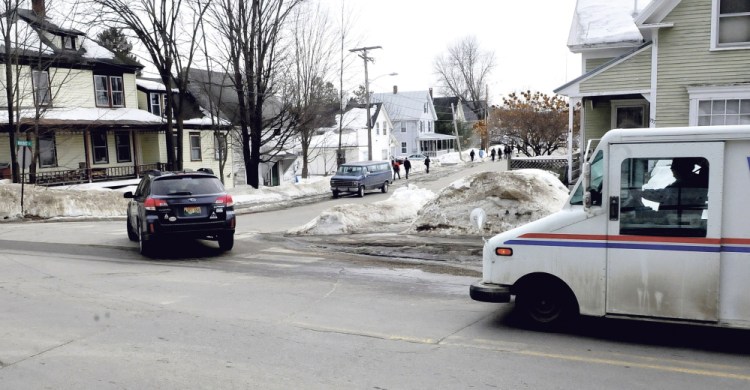FARMINGTON — In an effort to end a debate about a proposed wood-chip-fueled heating plant for the University of Maine at Farmington, members of the town’s Planning Board will stand on downtown street corners to observe whether a tractor-trailer laden with wood chips can make a turn onto Quebec Street.
The site visit and final Planning Board meeting on the proposed UMF central heating plant on Quebec Street will be held Monday, and board members expect it will be the last time the subject will need to be reviewed before they take a vote.
UMF is proposing to build an $11 million, 5,885-square-foot biomass central heating plant on the site of a university parking lot near the intersection of Perkins and Quebec streets. The biomass fuel plant is expected to replace 390,000 gallons of heating oil now used to heat the buildings through individual systems. The plan calls for centralizing the heating system and is projected to reduce the university’s carbon emissions by 3,000 tons a year.
Town Manager Richard Davis said two routes will be tested. One runs from Front Street to Broadway, which becomes Perham, and turns right onto Quebec Street. The other route starts on High Street, turns right onto Middle Street and right again onto Quebec Street.
Planning Board member Gloria McGraw said she would ride in the truck to observe the process.
Project officials at the meeting talked about hiring a truck from Cousineau Wood Products, of North Anson, for the test, because Cousineau could be a wood chip supplier for the project.
The Monday board meeting will be the third the board has held on the project. At the initial meeting with project developers and again at a two-and-a-half hour meeting Monday night, residents voiced concern about whether the development would harm the character of the neighborhood and whether the side road could handle the increased truck traffic required to maintain an adequate supply of wood. About 30 people attended the meeting, including UMF President Kathryn Foster.
During peak heating season, UMF director of facilities Jeff McKay said the plant would need 10 to 11 wood chip deliveries a week. The university now receives 40 to 50 deliveries of oil, in smaller trucks, during the peak heating season.
During Monday’s test drive, the tractor-trailer will try two routes and also will try to turn onto Quebec Street from Middle Street.
Tom Perkins, of Dirigo Architectural, which is overseeing the project for UMF, told the Planning Board that a civil engineer determined a tractor-trailer should be able to make the turn, a point he illustrated with a graphic representation of a turning radius.
“There’s been a lot of field investigation,” said Mark Power, team leader from Trane Inc., which is contracted to build the project.
Meanwhile, the project was voted down by the Farmington Village Corporation, which has its own Planning Board with authority over the downtown area. Members of the village corporation board attended the Planning Board meeting and later convened in their own meeting and voted against the boiler project as a nonconforming project for residential zoning.
Farmington’s attorney, Frank Underkuffler, said the village corporation — a quasi-government agency that over the years has been reduced to a planning board and water district — does not appear to have the power to overrule Farmington in this situation. When a conflict arises between the two planning boards, Underkuffler said, the village corporation can supplement the municipality but can’t supplant it.
Davis said he couldn’t recall a time when the two entities had a controversy about town planning.
“If there becomes a controversy between the two, the town’s would most likely prevail, but it would likely require a court action,” Davis said.
Jane Woodman, business director of the Farmington Village Corporation, said Underkuffler’s statement was the first time she had heard the town say that it has more authority over planning than the corporation.
Woodman said either UMF could appeal the decision with the village corporation, and at that point the corporation would get its attorney involved, or the university could wait to see if the town decides to approve the boiler project and claim the town decision overrides the corporation’s vote.
Kaitlin Schroeder — 861-9252
Copy the Story LinkSend questions/comments to the editors.



Success. Please wait for the page to reload. If the page does not reload within 5 seconds, please refresh the page.
Enter your email and password to access comments.
Hi, to comment on stories you must . This profile is in addition to your subscription and website login.
Already have a commenting profile? .
Invalid username/password.
Please check your email to confirm and complete your registration.
Only subscribers are eligible to post comments. Please subscribe or login first for digital access. Here’s why.
Use the form below to reset your password. When you've submitted your account email, we will send an email with a reset code.